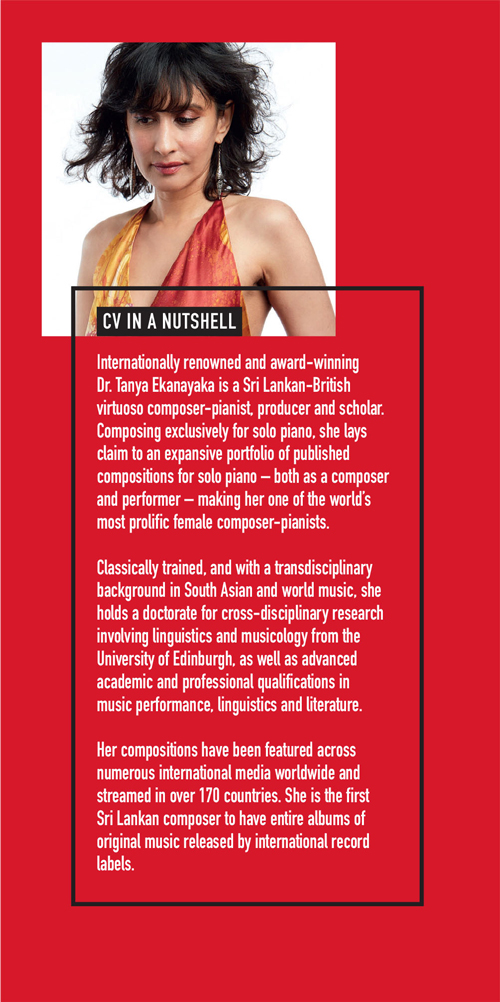Dr. Tanya Ekanayaka
Being present in the moment
Q: Can you tell us about your journey as a composer-pianist and how you developed your unique trans-genre style?
A: I started composing music for solo piano when I was a child. My compositional process, which combines spontaneity with meticulous attention to detail, is indebted to a very slow and natural development spanning several decades.
I made no conscious attempt to develop any specific style of composition – rather, my intention throughout has been to create narratives through solo piano rooted in my thoughts on life and music, experiences and backgrounds. As such, my style keeps evolving as my own life evolves.
Q: What inspires your compositions – and are there specific themes or elements that you frequently explore in your music?
A: Over the years, my music has been inspired by so much in such differing ways that I would need to discuss a range of my compositions in detail to address this question meaningfully.
Broadly, reflections on life, contentment, identity, contrasting musical cultures and musical genres, human language, and my love of wildlife and the natural world have been strong influences.

Q: As an internationally acclaimed artiste, how do you navigate the cultural influences from both Sri Lanka and Britain in your compositions?
A: When composing music, I’m not ‘navigating’ cultures consciously but allowing myself to be fully present in the moment, which entails leaning into all that is within me and equally, my surroundings.
The term ‘culture’ is so layered, after all. I see myself as identifying more with ‘states of being’ and the themes I explore in my music often have a broad relevance not limited to specific cultures alone.
Certainly, living in Sri Lanka during the first decades of my life immersed in contrasting cultures and perspectives (some of which are linked to Sri Lanka’s colonial past), and later dividing my time between Britain and Sri Lanka, have made me reflect deeply on my artistry and purpose, and influenced my approach to composition-performance more generally.
Q: Your portfolio includes a wide range of solo piano compositions. How do you approach the challenge of creating diverse and innovative pieces within the constraints of one instrument?
A: The piano is a constant source of discovery for me and my music is a result of this. Had I ever felt constrained by the piano, I’d have chosen to incorporate other instruments in my music.
It is also ideally suited to the two dimensions of my artistry – composing and presenting-performing my own music – because it has the capacity to stand alone as a medium of complete expression, similar to a human language.
In my case, the relationship between composing and performing is deeply bidirectional, and also core to the range of sounds I create.
Q: As a female composer-pianist, have you faced any particular challenges in the music industry? And if so, how have you overcome or embraced them?
A: Challenges are an inevitable part of journeying as a creative. I have certainly faced many challenges in my journey – particularly as a female composer-pianist of South Asian heritage working within a sphere where there are few like me.
Few know about the historical connection between countries like Sri Lanka and the piano, and not everyone grasps the ways in which or reasons why aspects of a contemporary South Asian identity might be inscribed onto the piano.
I have at times anticipated certain challenges and believe that many of them have helped me grow. This might be because I have an uncomplicated focus as a composer-pianist to create the best music I possibly can (in my own time) while staying entirely true to my vision.
This focus is a place of deep contentment and it keeps me grounded.
Q: Are there specific cultural or societal messages that you aim to convey through your music – and how do you use composition as a means of communication?
A: Yes and no. The music stands alone, and can be appreciated and understood as it is. However, my compositions do encompass my own thoughts and often have an underlying conceptual basis.
My published music includes notes written by me detailing these and how the structure of the music conveys them. The titles of my compositions are also a part of this.
Q: What advice do you have for aspiring composer-pianists looking to make their mark in the world of music?
A: Try not to pursue fame and external validation; and try not to be swayed by trends.
Endeavour to really understand your instrument, be open-minded, find your inner peace and craft music that, to you, feels authentic.


